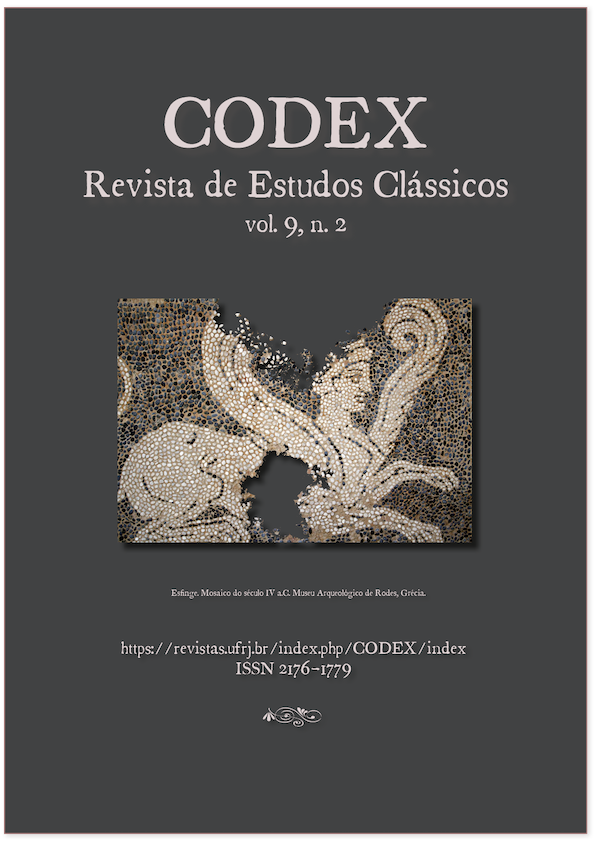The bucolic genre in Os Lusíadas
DOI:
https://doi.org/10.25187/codex.v9i2.45780Keywords:
Os Lusíadas, bucolic genre, generic mixtureAbstract
The phenomenon of generic mixture is old among the poets, even though the poetry theorists have not always acknowledged it. This article’s goal is to investigate the coexistence between the epic and bucolic genres in Os Lusíadas. Although this poem is an epic, and Virgil’s Aeneid is its main model of composition, it is relevant to notice, with authors such as Macedo (1992), Mulinacci (2011), and Binet (2019), that the Island of Love from Canto IX is a Renaissance version of locus amoenus, which is a commonplace of the tradition of pastoral poetry that starts with Virgil’s Eclogues. In order to demonstrate it, the textual analysis of the poem’s first stanzas and of some passages from the Island of Love episode has shown, respectively, Os Lusíadas’ predominant genre and the function of the bucolic genre in Camões’ epic. It is possible to conclude from this analysis that the bucolic genre has allegorical function in Os Lusíadas and that its local presence participates in the poem’s expansionist and Christian argument.
Downloads
References
ANDRÉ, C. A. Eneida e Os Lusíadas. In: AGUIAR E SILVA, V. M. (Org.). Dicionário de Luís de Camões. São Paulo: Leya, 2011, p. 337-341.
BARRETO, J. F. Micrologia Camoniana. Lisboa: Imprensa Nacional-Casa da Moeda, 1982.
BINET, A. M. de A. O episódio da Ilha dos Amores, uma imago mundi entre oriente e ocidente. In: NATÁRIO, M. C.; EPIFÂNIO, R.; MALATO, M. L. (org.). Portugal – Goa: os orientes e os ocidentes. Porto: Universidade do Porto, 2019, p. 35-43.
CAMERON, A. Vergil and the Augustan Recusatio. In: CAMERON, A. Callimachus and his critics. New Jersey: Princeton University Press, 1995, p. 454-483.
CAMÕES, L. V. de. Os Lusíadas. Edição: Emanuel Paulo Ramos. Porto: Porto Editora, 1980.
CIDADE, H. Luís de Camões: o épico. 2. ed. Lisboa: Livraria Bertrand, 1953.
CONINGTON, J. Vergili Maronis Opera. Londres: Oxford University Press, 1863. Vol. 2.
CONTE, G. B. Generi e lettori: Lucrezio, l’elegia d’amore, l’enciclopedia di Plinio. Milano: Mondadori, 1991.
CONTE, G. B. Memoria dei poeti e sistema letterario. Torino: Giulio Einaudi, 1974.
CONTE, G. B. The rhetoric of imitation. Ithaca; London: Cornell University Press, 1986.
DIAS, E. Os Lusíadas. 3. ed. Rio de Janeiro: Ministério da Educação e da Cultura, 1972.
DIAS, F. B. [Sem título]. In: CAMÕES, L. de. Os Lusíadas. Edição fac-similar. Coimbra: Almedina; Colégio das Artes da Universidade de Coimbra, 2016, p. 7-9.
ERASMO DE ROTERDÃ. Dialogus Ciceronianus. Edição: Pierre Mesnard. In: ERASMO DE ROTERDÃ. Opera Omnia Desiderii Erasmi Roterodami. Amsterdam: North-Holland Publishing Company, 1971. Vol 2, p. 581-710.
FARRELL, J. Classical Genre in Theory and Practice. In: New Literary History, Pennsylvania, v. 34, n. 3, 2003, p. 383-408.
FILIZOLA, A. A épica e o pastoril: a Écloga IV de Virgílio e Os Lusíadas de Camões. In: Letras, Curitiba, n. 40, p. 31-43, 1992. Disponível em: https://revistas.ufpr.br/letras/article/view/19133/12432. Acesso em: 8 nov. 2021.
FOWLER, A. Kinds of Literature: An Introduction to the Theory of Genres and Modes. Oxford: Oxford University Press, 1982.
FOWLER, A. The formation of genres in the Renaissance and after. In: New Literary History, v. 34, n. 2, p. 185-200, 2003.
GREENE, T. M. The light in Troy: imitation and discovery in Renaissance Poetry. New Haven; London: Yale University Press, 1982.
HANSEN, J. A. A máquina do mundo. In: NOVAES, A. (Org.). Poetas que pensaram o mundo. São Paulo: Companhia das Letras, 2005, p. 157-197.
HANSEN, J. A. Notas sobre o gênero épico. In: TEIXEIRA, I. (Org.) Multiclássicos épicos. São Paulo: EDUSP, 2008. p. 17-91.
HARDWICK, L. Reception studies. Greece & Rome: New surveys in the Classics No. 33. Oxford: Oxford University Press, 2003.
HARRISON, S. J. Generic enrichment in Vergil and Horace. Oxford: Oxford University Press, 2007.
JAUSS, H. R. Theorie der Gattungen und Literatur des Mittelalters. In: JAUSS, H. R. Alterität und Modernität. München: Wilhelm Fink Verlag, 1977, p. 327-358.
KÖHLER, E. Gattungssystem und Gesellschaftssystem. In: HAUPT, B. (org.). Zum mittelalterlichen Literaturbegriff. Darmstadt: Wissenschaftliche Buchgesellschaft, 1985, p. 111-129.
MACEDO, H. Os Lusíadas: celebração épica como crítica pastoril. In: REUNIÃO INTERNACIONAL DE CAMONISTAS, 5., 1987, São Paulo. Atas [...]. São Paulo: FFLCH/USP, 1992, p. 117-122.
MARCIAL, M. V. Epigrammata. Edição: W. M. Lindsay. 2. ed. Great Britain: Oxonii E Typographeo Clarendoniano, 1929.
MARTINDALE, C. Redeeming the text: latin poetry and the hermeneutics of reception. Cambridge: Cambridge University Press, 1993.
MIRANDA, M. O Humanismo jesuítico e a identidade da Europa: uma ‘Comunidade Pedagógica Europeia’. In: Humanitas, Coimbra, n. 53, 2001, p. 83-112.
MULINACCI, R. Locus amoenus. In: SILVA, V. M. E. (Org.). Dicionário de Luís de Camões. São Paulo: Leya, 2011, p. 477-482.
PASQUALI, G. Arte Alusiva. Tradução: Alexandre Piccolo e Lucy Ana de Bem. In: PRATA, P.; VASCONCELLOS, P. S. de. (org.). Sobre intertextualidade na literatura latina: textos fundamentais. São Paulo: Editora Unifesp, 2019, p. 11-21.
SENA, J. de. Estudos sobre o vocabulário de Os Lusíadas. Lisboa: Edições 70, 1982.
SILVA, J. de O. E. Moving the Monarch: The Rhetoric of Persuasion in Camões’s Lusíadas. In: Renaissance Quarterly, n. 53, 2000, p. 735-768.
SILVA, V. M. A. E. Ilha dos Amores (Episódio da). In: SILVA, V. M. E. (Org.). Dicionário de Luís de Camões. São Paulo: Leya, 2011, p. 437-444.
SNELL, B. L’arcadia: scoperta di un paesaggio spirituale. In: SNELL, B. La cultura greca e le origini del pensiero europeo. Trad. Vera Degli Alberti e Anna Solmi Marietti. 2. ed. Torino: Piccola Biblioteca Einaudi, 1963, p. 387-418.
TREVIZAM, M. Modulações genéricas em Virgílio. In: Rónai, Juiz de Fora, v. 8, n. 2, 2020, p. 46-61.
VIEIRA, Y. F. Mitologia, alegoria e discurso: observações sobre o “discurso alusivo” de Camões. In: Revista Camoniana, São Paulo, v. 3, n. 2, 1980, p. 189-206.
VIRGÍLIO. Eclogues. Georgics. Aeneid: Books 1-6. Edição: Jeffrey Henderson. Trad. H. R. Fairclough. Rev. G. P. Goold. Cambridge (MA): Harvard University Press, 1999. Loeb Classical Library 63. Vol 1.
Downloads
Published
How to Cite
Issue
Section
License
This work is licensed under a Creative Commons Attribution-NonCommercial 4.0 International License.










